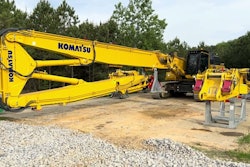Artificial intelligence (AI) has wide-reaching implications for the construction industry. Technological advances using AI for machine learning, data analytics, safety, and general decision-making have changed the lifecycle of the construction process.
“The industry has immense opportunities to evaluate how we can better deliver projects, and we can lean on AI in achieving essential goals like upskilling, workforce development, knowledge transfer, supply chain optimization, enhanced safety design and planning, and much more," said Patrick Scarpati, Associated Builders and Contractors director of construction technology and innovation. "The possibilities of AI technology may sound endless, but as an industry traditionally looking from the outside in at technology, we must first step back to educate ourselves on the basics.”
As such, ABC has released an AI technology guide as a starting point in that education process, providing contractors a chance to understand AI and its potential impact on the construction industry.
The guide describes the uses of AI during the construction project lifecycle, including preconstruction, construction, and building maintenance. In addition, it defines several terms such as deep learning, predictive AI, and more, as well as reviewing some of the best practices in drafting office AI policies.
"By reading through definitions, construction use cases and considerations, the reader should walk away with a level of knowledge to ensure they can actively participate in future conversations on AI in construction,” the guide, written by Scarpati, states.
ABC fully acknowledges within its guide that there remain many unknowns regarding what the impact of AI will be and what technology could look like in just a few years. As the industry continues its drive toward a digital transformation, questions must be raised.
According to the guide, contractors are encouraged to consider how AI can increase productivity or eliminate manual tasks that can bog down a workday. Secondly, there needs to be a greater understanding and allowance of a more digital workforce.










